When it comes to SEO tools, two names consistently stand out: Semrush and Ahrefs. Both platforms are packed with features designed to help marketers, bloggers, and businesses boost their search engine rankings, analyze competitors, and grow their online visibility. But which one is the better choice for your needs?
In this in-depth comparison of Semrush vs Ahrefs, we’ll break down the key differences across features like keyword research, site audits, content marketing, backlink analysis, pricing, and more. Whether you’re a beginner or an experienced SEO professional, this guide will help you decide which tool offers the best value for your goals.
Keyword Research
When it comes to keyword research, both Semrush and Ahrefs offer powerful tools—but they take different approaches.
Semrush provides a comprehensive Keyword Magic Tool with over 25 billion keywords. It lets you filter by broad match, phrase match, exact match, and related keywords. One standout feature is Keyword Intent, which labels keywords as informational, transactional, commercial, or navigational. This helps you align your content with user search intent more effectively.
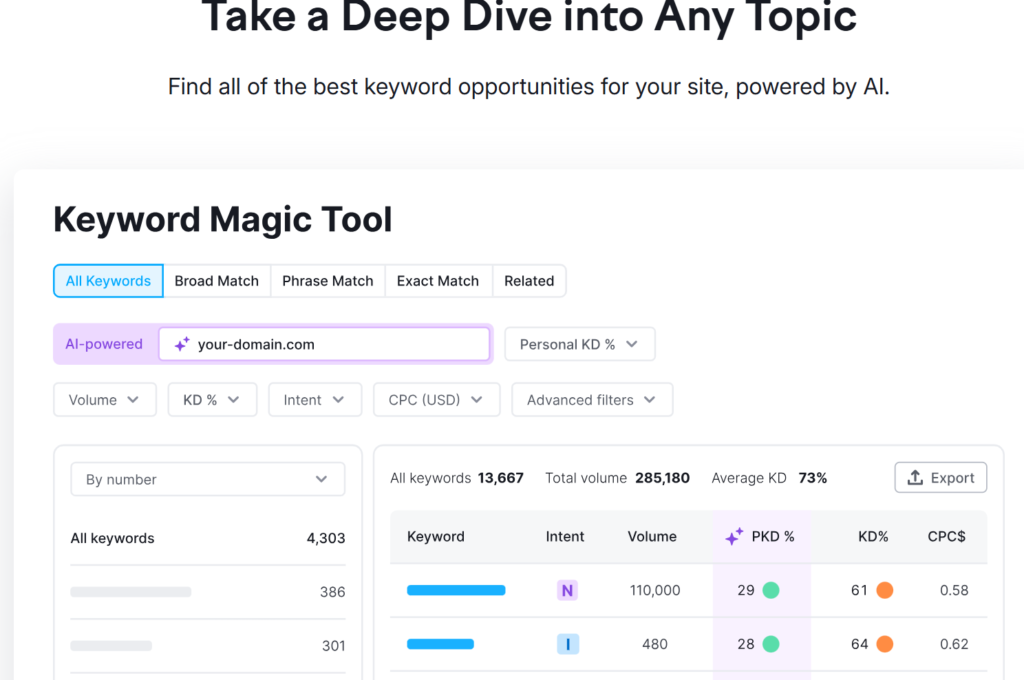
Ahrefs, on the other hand, shines with its Keyword Explorer. It offers keyword suggestions across multiple platforms—Google, YouTube, Amazon, Bing, and more. A unique feature is its “Clicks” metric, which shows how many people actually click on results after searching a keyword. This helps you avoid keywords with high search volume but low click potential.
When comparing Semrush vs Ahrefs for keyword research, Semrush gives more structured filtering and keyword intent insights, while Ahrefs provides richer click data and multi-platform versatility.
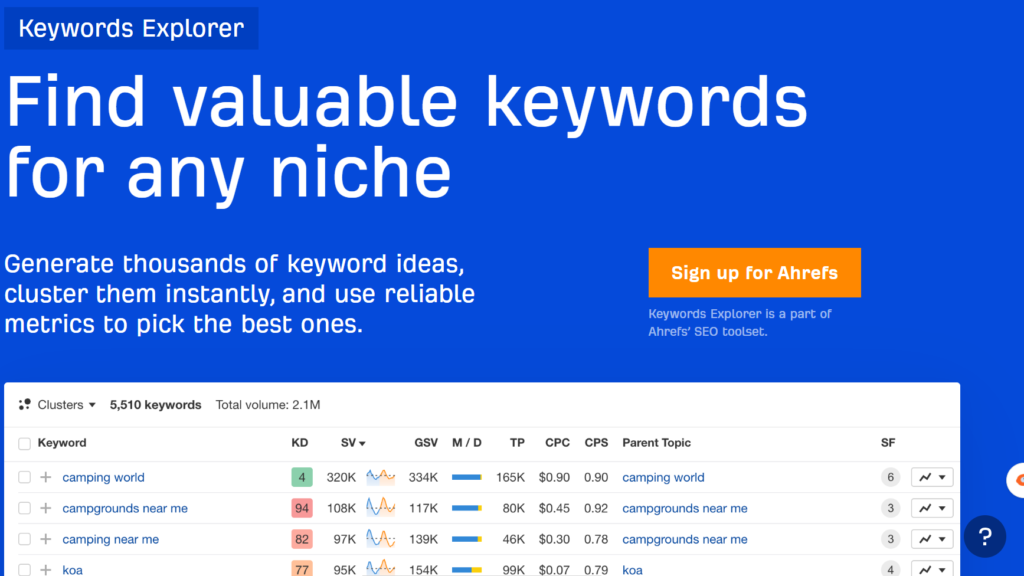
Backlink Analysis
Backlink analysis is a key feature in both tools, but there are some notable differences in how Semrush vs Ahrefs handle it.
Ahrefs is widely recognized for having one of the largest and most up-to-date backlink databases. Its Site Explorer tool provides detailed insights into referring domains, anchor text distribution, dofollow vs nofollow links, and historical backlink growth. One of Ahrefs’ strongest features is its “Link Intersect” tool, which shows you which sites are linking to your competitors—but not you.
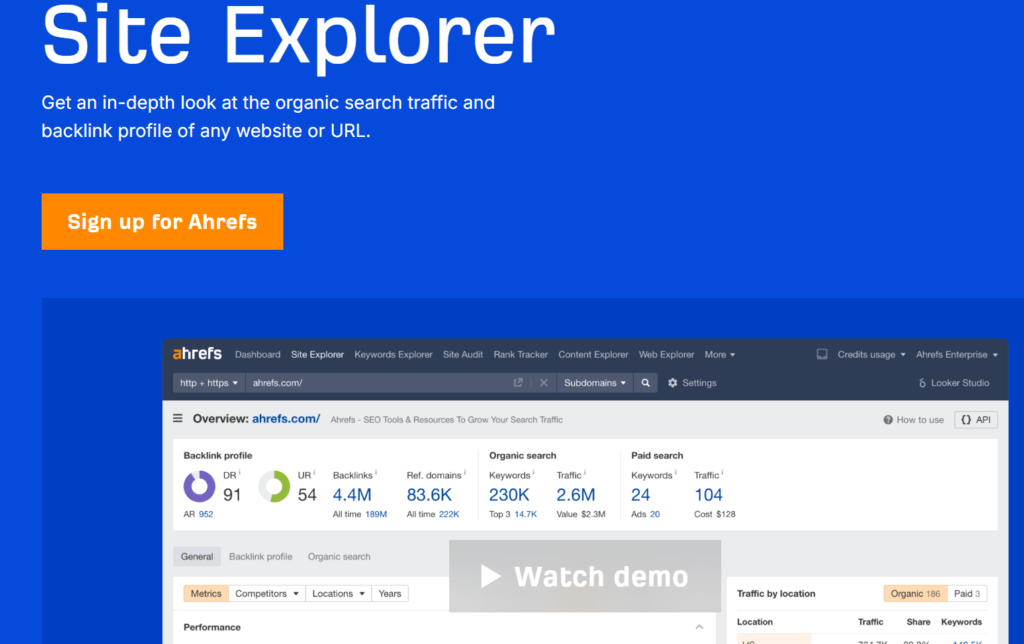
Semrush also offers a robust backlink analysis tool through its Backlink Analytics and Backlink Audit features. It provides metrics like Authority Score, Toxic Score (for detecting spammy links), and detailed reports on backlink types and sources. Semrush is especially strong when it comes to identifying potentially harmful backlinks and helping you clean up your link profile.
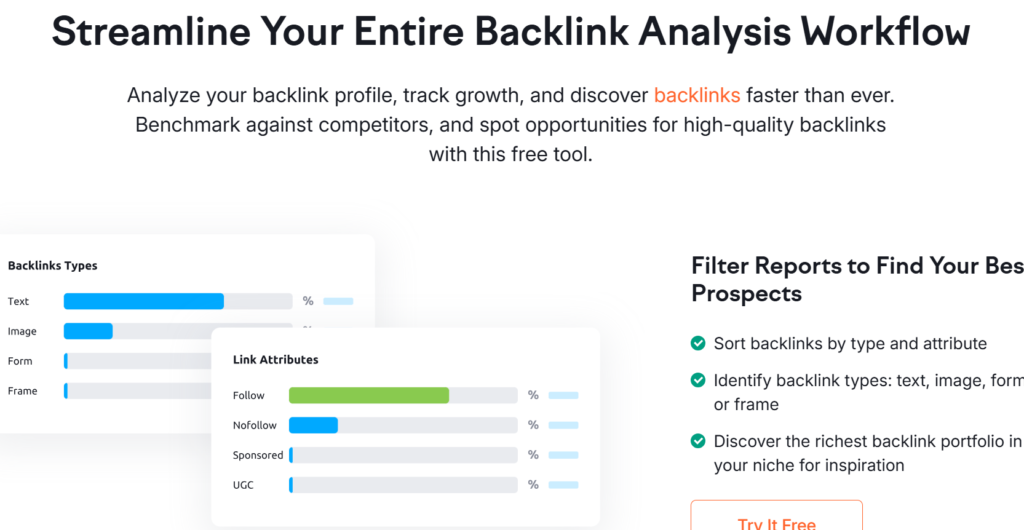
In the Semrush vs Ahrefs debate, Ahrefs leads in raw backlink data and link discovery speed, while Semrush is better for backlink auditing and toxic link identification.
Site Audit Capabilities
Both Semrush and Ahrefs offer powerful site auditing features to help you identify and fix technical SEO issues. However, their approaches and depth of analysis vary.
Semrush provides a comprehensive Site Audit tool that checks for over 140 SEO issues, including crawlability, HTTPS implementation, Core Web Vitals, internal linking, and duplicate content. One of its standout features is the SEO Health Score, which gives you a quick overview of your site’s condition. It also offers detailed recommendations and progress tracking over time.
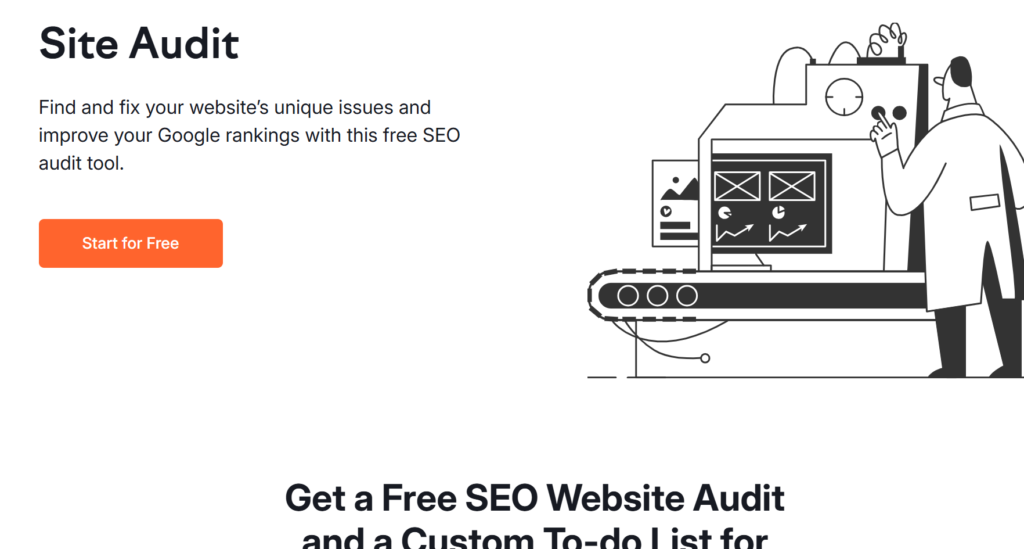
Ahrefs also includes a strong Site Audit tool, which runs on a cloud-based crawler. It checks for common issues like broken links, redirect chains, orphan pages, and HTML tag problems. The visual presentation of data—especially the “Health Score” graph and issue distribution—makes it easy to interpret audit results.
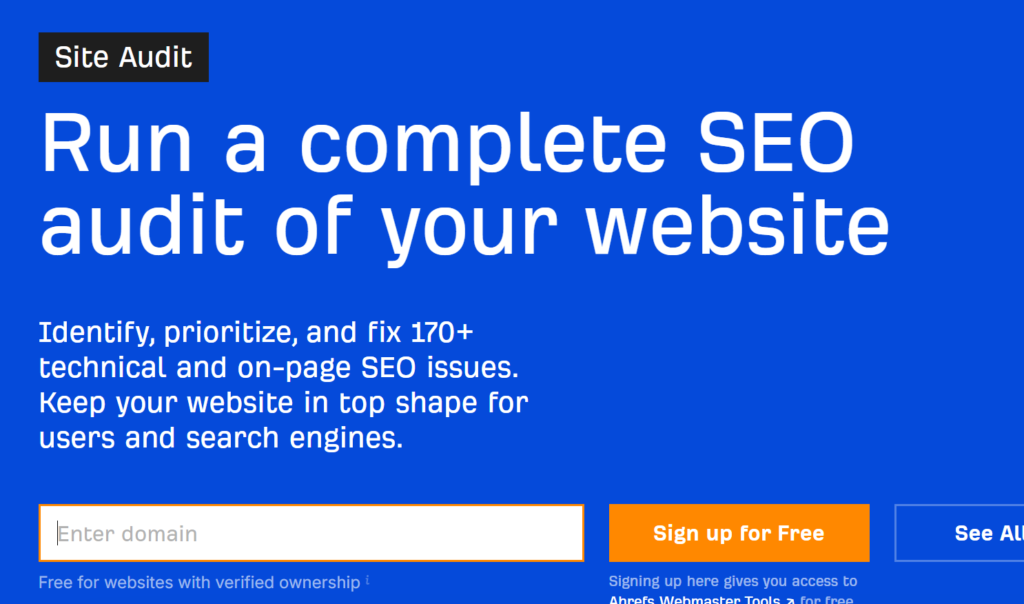
In a Semrush vs Ahrefs comparison, Semrush wins in terms of issue depth and fix guidance, while Ahrefs stands out for its visual reports and speed.
Rank Tracking
Rank tracking is essential for monitoring your SEO performance, and both Semrush and Ahrefs deliver solid features in this area—but with some key differences.
Semrush offers a dedicated Position Tracking tool that updates daily and allows you to monitor keyword rankings on desktop, mobile, and across specific geographic locations. You can also track your rankings against up to 10 competitors. One helpful feature is the Visibility Score, which shows how visible your website is in the search results overall.
Ahrefs, on the other hand, provides rank tracking through its Rank Tracker tool. It updates data less frequently (typically every 3–7 days depending on your plan) but gives a clean overview of your rankings, average position, traffic potential, and SERP features. It also includes competitor comparison and keyword grouping features.
In the Semrush vs Ahrefs showdown for rank tracking, Semrush has the edge with daily updates, more flexible location targeting, and real-time visibility metrics, while Ahrefs offers a more simplified interface with detailed ranking trends.
Content Marketing Tools
When it comes to content marketing, Semrush offers a much broader set of tools compared to Ahrefs.
Semrush includes an entire Content Marketing Toolkit that’s built to support every stage of content creation. With tools like the Topic Research feature, you can discover trending headlines, questions, and subtopics. The SEO Content Template gives you on-page SEO recommendations based on the top-ranking pages for your target keyword. Plus, the SEO Writing Assistant integrates with Google Docs and WordPress to help you optimize content in real-time.
Ahrefs, while more focused on SEO and backlinks, does offer some content-related tools. The Content Explorer is its main asset, allowing you to find high-performing content based on keywords, backlinks, social shares, and traffic. It’s especially useful for spotting viral topics and link-worthy content in your niche.
In a Semrush vs Ahrefs content marketing comparison, Semrush clearly leads with end-to-end content creation support, while Ahrefs focuses more on content discovery and analysis.
User Interface & Ease of Use
When comparing Semrush vs Ahrefs in terms of user interface, both platforms are intuitive—but their designs cater to slightly different users.
Semrush has a comprehensive dashboard with a lot of features in one place. While this is great for advanced users, beginners might feel overwhelmed initially. However, it offers customizable reports and tooltips that make navigation easier once you’re familiar with it.
Ahrefs features a more minimalist interface that’s clean and easy to understand. It’s ideal for users who want quick access to essential SEO tools without a steep learning curve. Most functions are accessible in just a few clicks, making it beginner-friendly.
In short, Semrush is more feature-rich but has a steeper learning curve, while Ahrefs offers simplicity and speed for everyday tasks.
Competitor Analysis
Semrush vs Ahrefs both excel at competitor analysis, but with unique strengths.
Semrush provides tools like Traffic Analytics, Keyword Gap, and Backlink Gap, which let you directly compare your site to your competitors. You can analyze their traffic sources, top pages, and even ad strategies. This makes Semrush great for full-funnel competitor research.
Ahrefs focuses on SEO-driven competitor insights. Its Site Explorer tool allows you to analyze organic keywords, backlinks, and top-performing content of any competitor. The Content Gap tool helps you find keywords your competitors rank for that you don’t.
Overall, Semrush gives a broader business overview, while Ahrefs is perfect for deep SEO competition insights.
Traffic Analysis
In the Semrush vs Ahrefs comparison for traffic analysis, Semrush has the upper hand.
Semrush’s Traffic Analytics tool estimates a website’s monthly traffic, user behavior, traffic sources, and even audience demographics. You can compare multiple domains and view metrics like bounce rate, average session duration, and top pages.
Ahrefs provides traffic insights through its Site Explorer, which estimates traffic based on keyword rankings and search volumes. While useful for SEO, it doesn’t offer behavioral metrics or detailed audience data.
For businesses needing comprehensive traffic data and competitive benchmarking, Semrush is the better choice. Ahrefs is more SEO-focused with lighter traffic estimation.
On-Page SEO Features
On-page optimization is essential, and here’s how Semrush vs Ahrefs stack up.
Semrush offers powerful on-page SEO tools like the On-Page SEO Checker and SEO Content Template. These tools analyze your pages and provide actionable suggestions for improvement based on your target keywords and competitors.
Ahrefs, while it doesn’t have a dedicated on-page optimization suite, offers some on-page insights through its Site Audit tool. It flags issues like missing meta tags, thin content, and improper heading structures.
If you’re looking for hands-on on-page SEO guidance, Semrush is the stronger tool. Ahrefs is better suited for diagnosing technical issues rather than providing content optimization recommendations.
Pricing & Plans
Here’s how the Semrush vs Ahrefs pricing structure compares.
Semrush offers three main pricing tiers:
- Pro: $129.95/month
- Guru: $249.95/month
- Business: $499.95/month
Each tier unlocks more features, users, and limits. Semrush also offers a 7-day free trial for new users.
Ahrefs offers four pricing plans:
- Lite: $99/month
- Standard: $199/month
- Advanced: $399/month
- Enterprise: Custom pricing
Ahrefs does not offer a free trial but does provide access to some free tools like its keyword generator and backlink checker.
In general, Semrush has higher entry-level pricing but offers a free trial, while Ahrefs starts cheaper but lacks a trial option.
Support & Documentation
When it comes to support, Semrush vs Ahrefs both do well—but Semrush offers more flexibility.
Semrush provides live chat, email, and phone support, along with a detailed knowledge base, webinars, and certification courses via Semrush Academy.
Ahrefs offers email support and a well-organized Help Center with tutorials and guides. It also has an active YouTube channel and blog for educational content.
For hands-on support and training resources, Semrush is more accessible and interactive. Ahrefs focuses more on self-service content and technical documentation.
Integrations & APIs
Integrations can significantly boost your workflow, and here’s how Semrush vs Ahrefs compare.
Semrush supports integrations with tools like Google Analytics, Google Search Console, WordPress, Trello, and HubSpot. It also offers a flexible API that gives access to keyword, domain, and backlink data—perfect for custom dashboards and reports.
Ahrefs is more limited in integrations. While it does offer an API, it’s only available on the Advanced and Enterprise plans. It doesn’t integrate natively with tools like Google Analytics or WordPress, so third-party solutions are needed for advanced workflows.
If integrations and API access are important to you, Semrush provides a more connected and flexible experience.
Local SEO Features
Local SEO is critical for businesses targeting specific geographic areas. In the Semrush vs Ahrefs battle, Semrush clearly has more to offer.
Semrush includes dedicated Local SEO tools like Listing Management, which helps you distribute and manage business listings across directories. It also allows you to track local keyword rankings and monitor Google Business Profile performance.
Ahrefs does not currently offer specialized local SEO features. While it allows for location-based rank tracking, there are no built-in tools for managing local listings or reviews.
For businesses focused on local visibility, Semrush is the clear winner.
PPC & Advertising Tools
While both platforms are known for SEO, only one stands out when it comes to PPC. Here’s how Semrush vs Ahrefs stack up.
Semrush includes comprehensive PPC and advertising tools. You can analyze competitors’ ad strategies, monitor paid keywords, and even create ad copies using its Advertising Research feature.
Ahrefs offers limited PPC data, mostly focused on keyword cost-per-click (CPC) and paid search competitors through the Site Explorer tool.
If your strategy includes Google Ads or paid campaigns, Semrush is far more robust and informative than Ahrefs.
Learning Curve & User Experience
How easy is it to learn and use these platforms? Let’s break it down for Semrush vs Ahrefs.
Semrush has a steeper learning curve due to its extensive features. However, it balances this with a user-friendly interface and rich educational resources, including Semrush Academy, certification courses, and tutorials.
Ahrefs is easier to pick up for beginners. Its interface is clean and straightforward, and the platform focuses heavily on core SEO features. It also provides helpful tooltips and documentation for self-guided learning.
For those who want an all-in-one platform with training, Semrush is great. If you’re looking for quick insights and a no-frills SEO experience, Ahrefs is a strong choice
Which One Should You Choose: Semrush vs Ahrefs,?
So, when it comes to Semrush vs Ahrefs, which tool is best for you?
Choose Semrush if you want:
- A complete SEO + PPC + content marketing suite
- Local SEO and ad research features
- Deep integrations and comprehensive support
- All-in-one tool for agencies and marketing teams
Choose Ahrefs if you prefer:
- A cleaner, more focused SEO experience
- Strong backlink and keyword data
- Easier onboarding and faster performance
- Competitive analysis with minimal complexity
Ultimately, both tools are excellent—but your choice depends on your specific goals. If you need an all-in-one marketing toolkit, Semrush is your go-to. If you want to master SEO with a simple, powerful interface, Ahrefs is a strong contender.
FAQs: Semrush vs Ahrefs
1. Which is better for keyword research: Semrush or Ahrefs?
Both tools are strong, but Semrush offers more filtering options and keyword intent insights, while Ahrefs provides unique click metrics and broader platform coverage. Semrush is better for structured keyword planning, whereas Ahrefs is great for finding high-performing keywords quickly.
2. Can I use Semrush or Ahrefs for free?
Semrush offers a limited free account and a 7-day free trial on its paid plans. Ahrefs doesn’t offer a free trial but does have free tools like a keyword generator, backlink checker, and website authority checker.
3. Is Semrush better than Ahrefs for local SEO?
Yes, Semrush has dedicated local SEO tools like Listing Management and local rank tracking, which Ahrefs does not currently offer.
4. Which tool is easier for beginners?
Ahrefs has a cleaner and simpler interface, making it easier for beginners. Semrush has a steeper learning curve but offers more features and in-depth training through Semrush Academy.
5. Do Semrush and Ahrefs provide API access?
Yes, both tools offer API access, but Semrush includes it in more plans, while Ahrefs only provides it on higher-tier plans.
6. Which tool updates rank tracking data more frequently?
Semrush updates ranking data daily, while Ahrefs updates it every 3–7 days depending on your subscription level.
7. Can I use Semrush or Ahrefs for PPC campaigns?
Semrush is better suited for PPC and advertising research, offering detailed tools for ad strategy and paid keywords. Ahrefs has minimal PPC capabilities.
Conclusion
In the ultimate showdown of Semrush vs Ahrefs, both tools bring powerful features to the table, making them top contenders in the SEO world. Semrush excels with its comprehensive suite for keyword research, content marketing, PPC, and local SEO, making it the ideal choice for businesses and agencies looking for an all-in-one solution. On the other hand, Ahrefs stands out with its robust backlink analysis, ease of use, and fast performance, making it perfect for users focused on mastering SEO and competitive research.
Ultimately, your choice between Semrush and Ahrefs depends on your specific needs. If you’re looking for a complete SEO toolkit with advanced reporting and integrations, Semrush is the way to go. However, if you prefer a more streamlined, focused tool with strong backlink data and competitive insights, Ahrefs might be the better fit.
Whichever tool you choose, both Semrush vs Ahrefs can help elevate your SEO strategy to the next level. Make sure to evaluate your goals and select the platform that aligns with your business requirements.


Additionally, it’s important to promote your blog through various social media channels. Employing social media effectively can broaden your audience base. Engagement from these platforms can drive traffic back to your blog.
business growth marketing http://marketingpitbull.com
This article will delve into current technology insights and their societal implications. Through the examination of these trends, we aim to offer insights into the future direction of technology.
ethical data practices http://wmta-online.com/why-privacy-is-the-new-currency-in-the-digital-age
Create your perfect online print in just a few clicks with rubber stamp maker online, stamp making online, rubber stamp online maker, stamp maker, online stamp maker, stamp maker online, stamp creator online, make a stamp online, make stamp online, online stamp design maker, make stamps online, stamps maker, online stamp creator, stamp online maker, stamp online maker free, stamp maker online free, create stamp online free, stamp creator online free, online stamp maker free, free online stamp maker, free stamp maker online, make stamp online free — fast, easy and free!
Enjoy the convenience and affordability of creating personalized stamps from the comfort of your home.
Benefits of Using an Online Rubber Stamp Maker
It’s easy to visualize the final product with an instant online preview before committing to your order.
Steps to Create a Rubber Stamp Online
Upload your design or use built-in templates; ensure high-resolution images for optimal print quality.
Choosing the Right Rubber Stamp Maker
Choose a reputable service with positive customer feedback and a secure process for payment and order tracking.
Another important factor is product reviews and ratings.
dependable shopping sites https://storesonline-reviews.com/how-reliability-shapes-the-way-we-choose-where-to-shop/